

The New Territories is a region of rich traditions with a full spectrum of beliefs and customs associated mainly with seasonal celebrations, divinity and spirit worship as well as rites of passage.
|
"Tai Ping Ching Chiu" festival is celebrated in the agrarian
communities in the New Territories of Hong Kong.
|
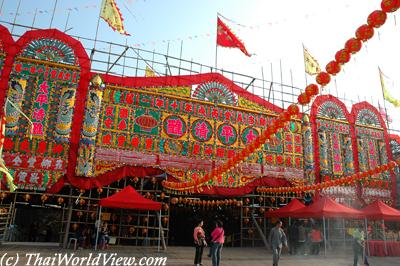
|
| Huge opera tent |
|---|
In Hong Kong, the "Tai Ping Ching Chiu" is held normally every ten years. The frequency of staging such traditional event varies from village to village. While ten years is the norm, "Tai Ping Ching Chiu" is held every five years in some communities and every year in Cheung Chau island. It is then also called "Cheung Chau Bun festival".
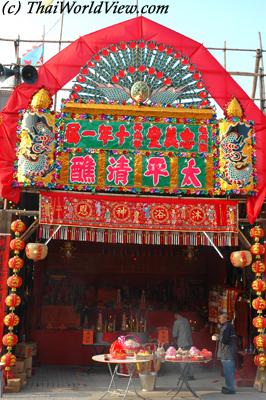
|
Altar tent where local people can worship
|
| Altar tent |
|---|
This festival is held every ten years to ask from the gods blessings, comfort and confidence for families. "Tai Ping Ching Chiu" is a Taoist festival of peace and renewal. The participants summon all of their gods and ghosts so that the gods' collective power will renew their lives.
|
Many local people come to make numerous offerings at all the festive altars.
|
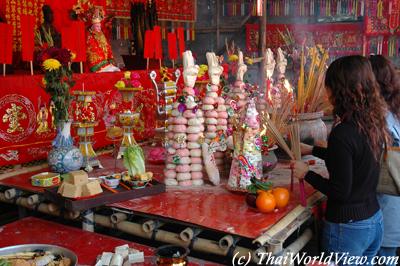
|
| Tai Ping Ching Chiu |
|---|
The "Tai Ping Ching Chiu" is also called "Ta Tsiu", "Da Chiu", "Jiao" or "Jiu". The English translation is "the Purest Sacrifice Celebrated for Great Peace" festival.
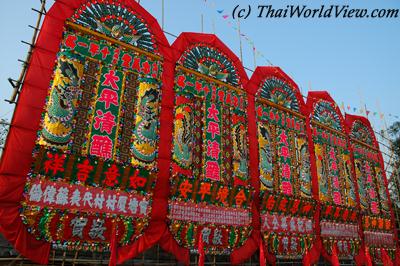
|
During the five-day festival residents and visitors are encouraged
to eat vegetarian food and eating and bringing animal meat into the village are prohibited which
according to villagers will bring bad luck.
|
| Huge billboard |
|---|
Normally there are elaborate "5 days" festivals celebrations in the New Territories but it could be "3 days" festivals as practised in Shek O on Hong Kong island.
|
"Tai Ping Ching Chiu" festival is normally held every ten years, i.e.
Lam Tsuen in 2008, Sha Kong Wai and Tai Wai in 2007. Tuen Mun, Shek O (18th occasion),
Nga Tsin Wai Tsuen (29th occasion),
Kat O (24th occasion) hold similar festival in year 2006. Chap Wai Kon, Kam Tin in year 2005.
Ha Tsuen in year 2004. Tap Mun island in year 1999.
|
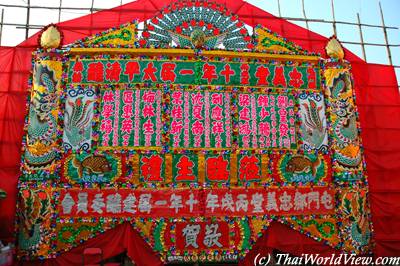
|
| Huge billboard |
|---|
The shortest cycle is the "Tai Ping Ching Chiu" of Cheung Chau where it is celebrated yearly. The longest is Sheung Shui and Shuen Wan where the "Tai Ping Ching Chiu" is celebrated once every 60 years. In some fishing villages in the New Territories, it is celebrated once every two or seven years. A five-year cycle is also practised in some agrarian communities like Tai Hang. However, a ten year cycle is the most popular in agrarian communities.
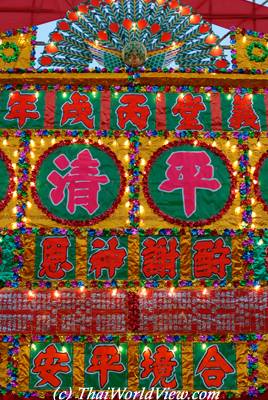
|
Sometimes, the Tai Ping Ching Chiu festival is divided into two periods,
i.e. Taoist rites and puppet theatre performances given followed by a separate period
in which opera performances were given.
|
| Huge billboard |
|---|
This allows people to enjoy themselves by eating meat while watching the opera. The separation of opera from renewal rites adds significantly to the costs and doubles the time involved.
|
For the villagers themselves, the "Tai Ping Ching Chiu" festival
is the most important community-wide event.
|
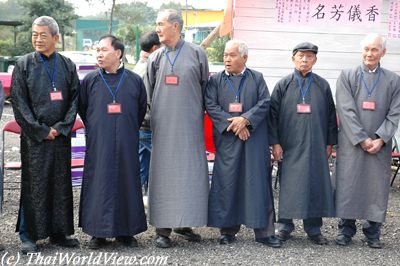
|
| Ritual representatives |
|---|
In the "Tai Ping Ching Chiu" festivals in the New Territories, only indigenous residents are eligible candidates who may be chosen to serve as ritual representatives. Sometimes each participating village has a quota of ritual representatives.
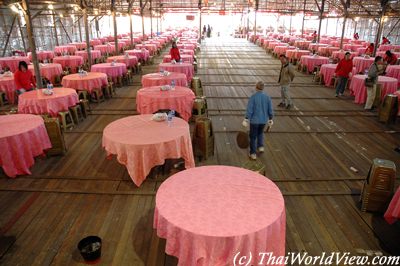
|
Under the opera temporary structure, local people are helping to
prepare the numerous tables for "Poon Choi" banquet.
|
| Poon Choi tables |
|---|
Shed theatres are usually made of bamboo, wood and palm leaves. These materials are highly flammable and fires were a common hazard to troupes and villages. By the early 1960s, some shed theatres were made from galvanized iron, which was safer and stronger.
|
Hundreds of people can enjoy Chinese opera but pictures are strictly forbidden
during representations for copyright issue. Stage operas are said to provide
entertainment for dead souls. First rows shall be reserved for ghosts.
|
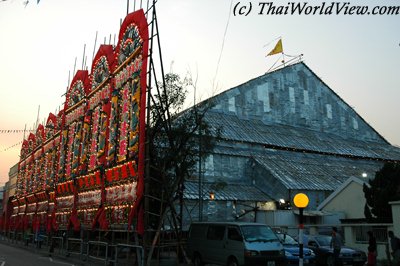
|
| Huge opera temporary structure |
|---|
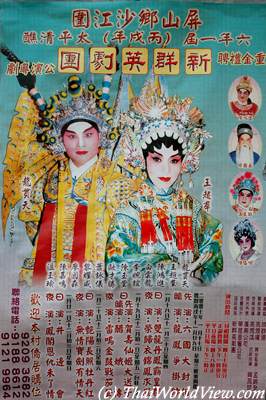
|
Poster announcing Chinese Opera performances during
Sha Kong Wai's "Tai Ping Ching Chiu" Festival.
|
| Opera poster |
|---|
|
Outside the venue, stalls sell auspicious products and there is a
festive atmosphere.
|
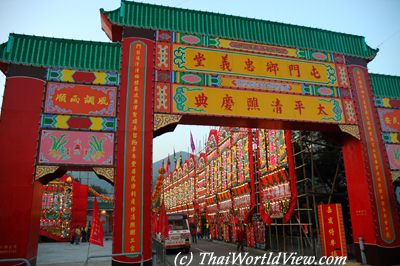
|
| Huge entrance |
|---|
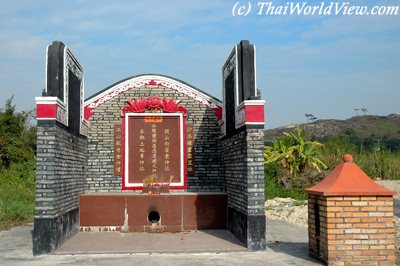
|
The priests and ritual representatives make offerings at the places of
earthgod.
|
| Earthgod |
|---|
The earth god of the "head" of a village guarded the "head" of the village, and his counterpart of the "tail" of the village guarded the "tail" of the village.
Click to see more pictures |
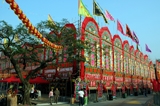
|
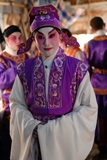
|
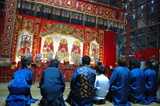
|
| Home > Culture > Traditional festivals > Tai Ping Ching Chiu |
| Page 1 | Page 2 | Page 3 | Page 4 | Page 5 | Page 6 |

|